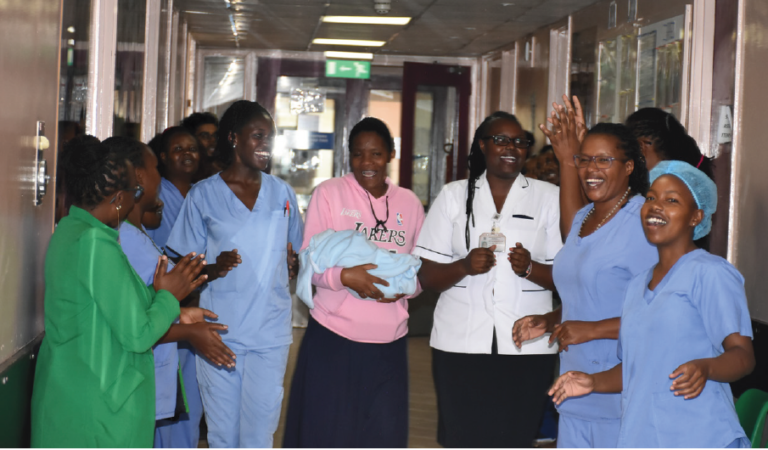
A few months ago, doctors at Kenyatta National Hospital (KNH) successfully transfused a baby while still in the womb. And on Monday, 20th November, 2023, Ms. Melodius Moraa walked out of the Hospital carrying her newborn baby boy whom she has rightly christened – Blessing.
When Moraa was 30 weeks pregnant, she was referred to KNH from Mama Lucy Kibaki Hospital where it was discovered the baby in her womb had anaemia.
According to Dr. Rosa Chemwey – Maternal Foetal Medicine specialist, the realization came after she was monitored under intensive surveillance.
“This was previous to her last 2 cases where she had lost the babies to anaemia. We immediately admitted her and transfused the baby while in the uterus. One month later, after consultation with Neonatal specialists, we decided to deliver the baby through Caesarian section. The baby was received and we continued the care in our Newborn Unit.” she added.
The highly delicate procedure, known as the Intrauterine Foetal Transfusion, was undertaken by a team of four doctors who included specialists Dr. Rosa Chemwey, Dr. Flavia Ogutu, Dr. Ikol Adung’o, and Dr. Kunjira Murayi (Interventional Radiologist).
They were assisted by Nurses Mr. Benson Nyankuru, Ms. Redempata Mumo, and a reproductive Health Clinical Officer – Tony Wainaina.
An Intrauterine transfusion is a procedure in which red blood cells from a donor are injected into the foetus and may be recommended when a foetus has anaemia (low red blood cell count).
Using ultrasound to determine the position of the foetus and placenta, the surgeon inserts a needle into the mother’s abdomen and then into the umbilical vein or the foetus’ abdomen. Red blood cells that are compatible with the foetus’ and mother’s blood type are passed through the needle into the foetus. The mother is then given antibiotics, local anaesthesia, and IV sedation, which also sedates the foetus. The foetus may also be given additional medication to stop movement.
Foetal transfusions may need to be repeated every few weeks until it is ready to be born.
Dr. Chemwey added that since Moraa’s pregnancy was high-risk, she needed urgent intervention in order for the baby to survive because it was too hazardous to continue the pregnancy to term. After the blood transfusion was conducted, she underwent a Caesarian section at 35 weeks and thereafter put under intensive care for monitoring.
Moraa was eventually discharged and remains grateful to the KNH medics for the safe and successful delivery of her baby. She now looks forward to start her motherhood journey as the baby is now healthy and is expected to develop normally.
